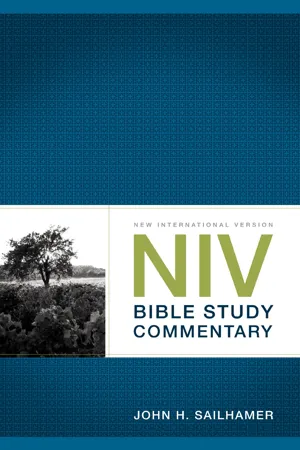
- 464 pages
- English
- ePUB (mobile friendly)
- Available on iOS & Android
NIV Bible Study Commentary
About this book
Helpful insights into the rich background and meaning of the Bible, in a convenient, one-volume commentary.
When reading Scripture, it's sometimes easy to get lost in the details, bogged down by all the different stories, lineages, rulers, peoples, numbers, and confusing phrases—specifics that only make sense in context, when we understand the Bible as a whole...
A clear and concise companion to the whole Bible, the NIV Bible Study Commentary will provide you with quick, insightful help in understanding the Bible while you're reading it. It's meant to be kept close at hand for reference while you study God's Word, and it will enrich your study.
The NIV Bible Study Commentary is perfect for:
- Anyone looking to grasp a fuller understanding of the Bible and the major themes interwoven throughout its pages.
- Bible college students, Sunday School teachers, pastors, and ministers wanting a handy reference resource.
- Those looking for a great gift to celebrate a graduation, birthday, or other milestone event.
Arranged according to all sixty-six books of the Bible for ease-of-use, this one-volume commentary provides insights into the history, events, people, and places found in the stories of Scripture.
ABOUT THE AUTHOR: John H. Sailhamer is professor of Old Testament at Golden Gate Baptist Theological Seminary in Brea, California, and was formerly senior professor of Old Testament and Hebrew at Southeastern Baptist Theological Seminary. His other works include An Introduction to Old Testament Theology and The NIV Compact Bible Commentary.
Tools to learn more effectively

Saving Books

Keyword Search

Annotating Text

Listen to it instead
Information
1 SAMUEL
Introduction
I. The Period of Samuel’s Judgeship (1Sa 1:1 – 7:17)
A. The Rise of Samuel and the Fall of Israel to the Philistines (1:1 – 4:22)
1. The story of Hannah (1:1 – 2:11a)
2. The exile of the ark (2:11b – 4:22)
B. The Return of the Ark and the Revival of the People (5:1 – 7:17)
1. The ark in exile and its return (5:1 – 7:1)
2. The lesson of obedience (7:2 – 17)
II. The Beginning of the Israelite Monarchy (8:1 – 15:35)
A. The Request for a King (8:1 – 22)
B. The Selection of Saul (9:1 – 10:16)
C. The Public Appointment of Saul (10:17 – 27)
D. The Divine Confirmation of Saul (11:1 – 15)
E. Samuel’s Speech (12:1 – 25)
F. Saul’s Failure as King of the Lord’s People (13:1 – 15:35)
1. Saul’s first offense (13:1 – 15a)
2. Saul’s campaign against the Philistines (13:15b – 14:52)
3. Saul’s second failure as king of the Lord’s people (15:1 – 35)
III. The Decline of Saul and the Rise of David (16:1 – 31:13)
A. David, the Man after God’s Own Heart: The Early Years (16:1 – 30:31)
1. The selection of David (16:1 – 23)
Table of contents
- Cover Page
- Title Page
- Copyright Page
- Contents
- Abbreviations
- Preface
- Introduction
- Genesis
- Exodus
- Leviticus
- Numbers
- Deuteronomy
- Joshua
- Judges
- Ruth
- 1 Samuel
- 2 Samuel
- 1 Kings
- 2 Kings
- 1 Chronicles
- 2 Chronicles
- Ezra
- Nehemiah
- Esther
- Job
- Psalms
- Proverbs
- Ecclesiastes
- Song of Song
- Isaiah
- Jeremiah
- Lementations
- Ezekiel
- Daniel
- Hosea
- Joel
- Amos
- Obadiah
- Jonah
- Micah
- Nahum
- Habakkuk
- Zephaniah
- Haggai
- Zechariah
- Malachi
- Matthew
- Mark
- Luke
- John
- Acts
- Romans
- 1 Corinthians
- 2 Corinthians
- Galatians
- Ephesians
- Philippians
- Colossians
- 1 Thessalonians
- 2 Thessalonians
- 1 Timothy
- 2 Timothy
- Titus
- Philemon
- Hebrews
- James
- 1 Peter
- 2 Peter
- 1 John
- 2 John
- 3 John
- Jude
- Revelation
- About the Author
- About the Publisher
Frequently asked questions
- Essential is ideal for learners and professionals who enjoy exploring a wide range of subjects. Access the Essential Library with 800,000+ trusted titles and best-sellers across business, personal growth, and the humanities. Includes unlimited reading time and Standard Read Aloud voice.
- Complete: Perfect for advanced learners and researchers needing full, unrestricted access. Unlock 1.4M+ books across hundreds of subjects, including academic and specialized titles. The Complete Plan also includes advanced features like Premium Read Aloud and Research Assistant.
Please note we cannot support devices running on iOS 13 and Android 7 or earlier. Learn more about using the app